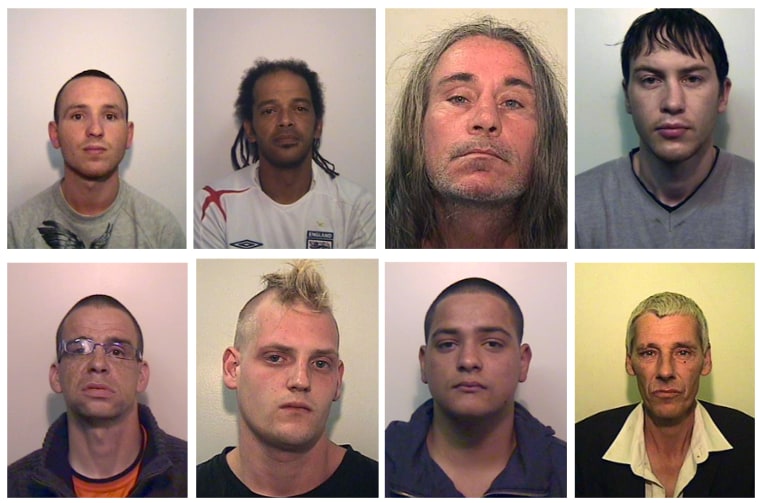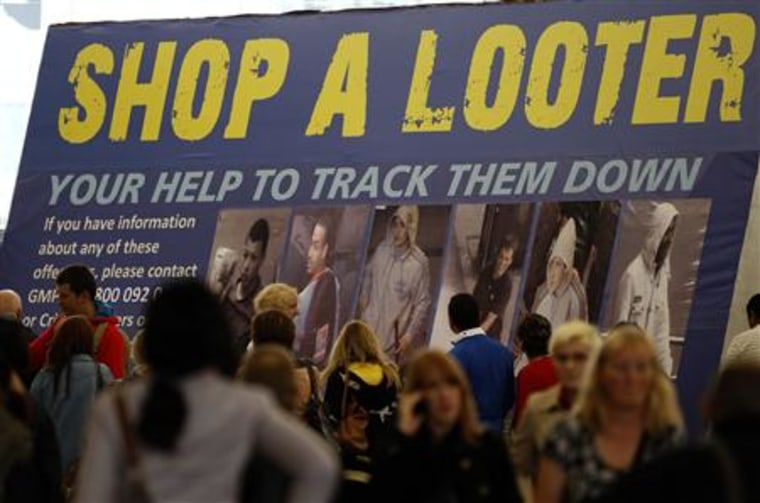British police flooded the streets Friday night to ensure weekend drinking does not reignite the rioting that swept London and other cities this week, shocking Britons and sullying their country's image a year before it hosts the Olympics.
Steve Kavanagh, deputy assistant commissioner of the Metropolitan Police, said 16,000 officers, instead of the usual 2,500, would remain on duty in London in their biggest peacetime deployment — a measure of the perceived public order challenge.
Other forces, including those in Nottingham, Birmingham and Liverpool, said they would maintain a high level of policing over the weekend, although they said that after a couple of nights of quiet they were not anticipating further trouble.
Even in normal times, alcohol-fueled street disorder is commonplace across urban Britain at the weekend.
British Prime Minister David Cameron, describing the several nights of wild looting, arson and violence, in which five people were killed, as "criminality, pure and simple," called the initial police response inadequate.
His remarks drew a sharp response from the police service, which is facing deep cuts in numbers as part of a sweeping government austerity drive aimed at slashing public debt.
"The fact that politicians chose to come back is an irrelevance in terms of the tactics that were by then developing," said Hugh Orde, head of the Association of Chief Police Officers, referring to Cameron and other senior ministers who cut short their holidays after two days of mayhem at home.
Public blames Cameron
More than half of Britons think Cameron failed to provide leadership early enough to control the riots, according survey results revealed Friday.
The ComRes poll for The Independent newspaper chimed with those of an ICM survey for The Guardian, in which only 30 percent said Cameron responded well to the riots while 44 percent thought the opposite.
The ComRes survey also found that only 36 percent have confidence in Cameron's leadership of Britain in general. A different poll by Reuters/Ipsos MORI on July 20 said only 38 percent were happy with the way he was doing his job.
Fifty-four percent said Cameron, who did not return from holiday until the riots reached their peak on Monday, had failed to provide leadership early enough.
Half of those polled also said they had less confidence in London's ability to hold safe Olympics next year, while a third had not changed their mind.
Help from US
William Bratton, credited with curbing street crime as police chief in New York, Los Angeles, and Boston, agreed on Friday to take a job helping Cameron quell the unrest.
Bratton told NBC on Friday: "This morning I had a conversation with Prime Minister Cameron in which he thanked me for my agreeing to work with the British government as they deal with the issues of gang crime, gang violence and gang intervention."
Bratton, chairman of the Manhattan-based private security firm Kroll, called the post a "short-term assignment" to help Britain develop strategies on dealing with widespread rioting and gang culture.
Hundreds arrested
More than 1,200 people were arrested during the unrest. One London looter, 24-year-old Natasha Reid, turned herself into police because she could not sleep for guilt after stealing a television, according to her defense lawyer.
In another case, Chelsea Ives, 18, one of thousands of people enrolled as "ambassadors" to help visitors to the 2012 Olympics, was identified by her mother who saw her on television after allegedly throwing bricks at a police car. Ives denied charges of burglary and violent disorder.
Courts have sat through the night to process those accused of crimes ranging from assault to stealing a bottle of water.
Offenders include a millionaire's daughter, a charity worker and a journalism student, though most are unemployed young men.
Some police forces have taken unusual steps to crack down on the protesters and deter future violence.
Greater Manchester Police launched a 'Shop A Looter' campaign using social media sites like Facebook and Twitter to encourage people to inform on those suspected of looting, and posted pictures on its website of people convicted of offenses.
Those pictures included a 46-year-old man sentenced to four months in prison for assaulting a police officer and a 28-year-old man sentenced to eight months for stealing clothes.

"The fight back has well and truly begun," Cameron told an emergency session of parliament Thursday, outlining a range of measures aimed at preventing any repeat of England's worst riots in decades. Targeting street gangs became a top priority.
The trouble began in London after police shot dead a black man and refused to give his relatives information about the incident, but then degenerated into widespread looting and violence in many parts of the capital and other major cities.
In an echo of the event that sparked the unrest, the Independent Police Complaints Commission said Friday it was investigating an incident in which a man arrested by police in London Wednesday became seriously ill in police custody.
The man is in hospital, where he remains in a serious condition, the IPCC said, stressing it had met with members of the man's family to address questions they might have.
Harsh measures
The Conservative Party, which irked traditional right-wing supporters by going into coalition with the left-leaning Liberal Democrats last year, is desperate to show it is tough on crime.
A Conservative minister said Friday he was exploring whether he could make it easier to evict people from government housing for rioting.
"That may sound a little harsh, but I don't think this is a time to pussyfoot around," Eric Pickles, communities minister, said, adding that the measure would require legal changes.
"These people have done their best to make people frightened on the streets where they live. They've done their best to destroy neighborhoods, and frankly I don't feel terribly sympathetic toward them."
The coalition is keen to regain the initiative after early criticism that it was slow to respond to the rioting which has overturned Britain's image abroad as a generally peaceable and orderly society.
A 68-year-old man who was attacked as he tried to put out a fire set by rioters in London Monday night died of his injuries, officials said Friday.
Three men were killed in Birmingham, central England, when a car drove into them as they tried to stop rioters, and a man died after being shot during riots in Croydon, south London.
